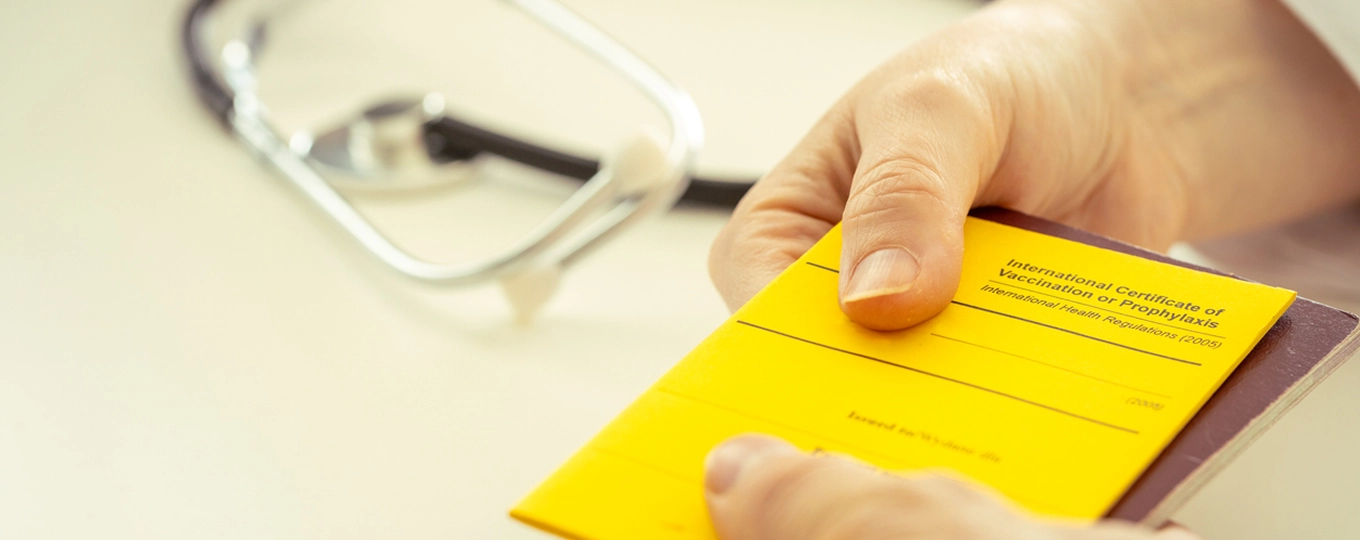Yellow Fever Vaccination Singapore – Guide for Travellers
What is Yellow Fever?
Yellow fever is a serious viral infection transmitted by mosquitoes, primarily found in tropical regions of Africa and South America. The disease is caused by the yellow fever virus, which spreads through the bite of infected Aedes or Haematosis mosquitoes. Contracting yellow fever can lead to hospitalisation, with severe cases potentially requiring intensive medical care. Because yellow fever can have a fatal outcome, travellers need to be particularly cautious when visiting affected areas.
Travellers visiting regions where yellow fever is prevalent without getting vaccinated or any mosquito protection face an increased risk of infection.
Why do I need to get vaccinated?
Prevention is the most effective way to protect against yellow fever. The yellow fever vaccine is the best defence, offering lifelong immunity after a single dose. Staying current with vaccinations enhances individuals’ well-being and allows them to participate in social activities with peace of mind, knowing they are protected against contagious diseases.
Singapore is currently free of yellow fever; however, regulations are in place to prevent its transmission and importation to Singapore.
All travellers, including Singaporean residents, going to or coming from countries with a risk of yellow fever transmission must acquire a valid Yellow Fever vaccination certificate. The vaccination certificate is only valid 10 days after vaccination and remains effective for life. Travellers arriving to Singapore must acquire a valid Yellow Fever vaccination certificate six days prior to their arrival. On arrival, travellers must present a valid vaccination certificate to the Immigration & Checkpoints Authority (ICA) at the immigration counter. Travellers without a valid certificate may be subject to quarantine for up to six days under the Infectious Disease Act.
Getting vaccinated at least 10 days before travelling to areas and countries where the disease is prevalent is recommended to ensure your body develops immunity by the time you arrive at your destination. It is also recommended to get the flu vaccination prior to your travels to protect you from the flu.
How do I get a Yellow Fever Vaccination & Certificate?
Yellow Fever vaccination services are available at the following Healthway Medical clinics which are licensed by the Ministry of Health Singapore (MOH) to administer Yellow Fever vaccines. The price below is inclusive of the hard copy of the International Certificate of Vaccination.
$268.99 per dose (before GSTCall any of the clinics below to book an appointment for your Yellow Fever Vaccination.
- Healthway Medical (Bukit Batok West)
- Healthway Medical (Limbang)
- Healthway Medical (Compassvale)
- Healthway Medical (Novena Medical Centre)
- Silver Cross Family Clinic (Bukit Timah)
- Healthway Medical (Yishun St 72)
- Healthway Medical (Ang Mo Kio Ave 8)
- Healthway Medical (Bukit Panjang)
- Healthway Medical (Fajar)
- Healthway Medical (Bukit Batok)
- Healthway Medical (Hougang Central)
- Healthway Medical (Medico Clinic & Surgery)
- Healthway Medical (Lengkong Tiga)
- Healthway Medical (Ang Mo Kio Ave 10)
- Healthway Medical (Anchorvale)
- Healthway Medical (Elias Mall)
- Healthway Medical (406 Sembawang)
- Healthway Medical (Downtown Gallery)
- Silver Cross Medical (Holland)
- Silver Cross Family Clinic (Yishun)
- Healthway Medical (Jalan Membina)
- Healthway Medical (Tampines St 71)
- United Medical Practitioners Pte Ltd
- Healthway Medical (Woodlands)
- Healthway Medical (Yishun Ave 5)
What are the side effects of Yellow Fever Vaccine?
Common side effects of the yellow fever vaccine includes:
- Mild headache
- Muscle pain
- Low-grade fever
- Soreness or redness at the injection site
- Fatigue
Most people experience only mild side effects, but it’s important to be aware of the potential risks. Always consult with your healthcare provider if you have concerns or pre-existing conditions.
FAQ on Yellow Fever
Initial symptoms include fever, chills, severe headaches, muscle aches, nausea, and fatigue, typically resolving within a few days. However, in some cases, the disease might progress to a severe phase, involving high fever, jaundice (yellowing of the skin and eyes), internal bleeding, and potentially life-threatening complications such as liver and kidney failure. In severe cases, yellow fever can lead to death.
Unfortunately, there is no specific antiviral cure for yellow fever once it has been contracted. Treatment is supportive, focusing on relieving symptoms and managing complications. Patients may require hospitalisation to receive intravenous fluids, pain relief, and treatment for organ dysfunction if the disease becomes severe. Rest, hydration, and monitoring are crucial in helping the body recover. In severe cases, intensive care support may be necessary, but recovery depends on the individual’s immune response and the extent of organ involvement.
In addition to vaccination, travellers should take precautions to avoid mosquito bites. This includes using insect repellent, wearing long-sleeved clothing, and staying in accommodations with screened windows or air conditioning. Sleeping under mosquito nets, especially in rural or jungle areas, is also recommended.
By staying vigilant and taking these preventative steps, travellers can significantly reduce their risk of contracting yellow fever and enjoy a safe journey in areas where the disease is endemic.


